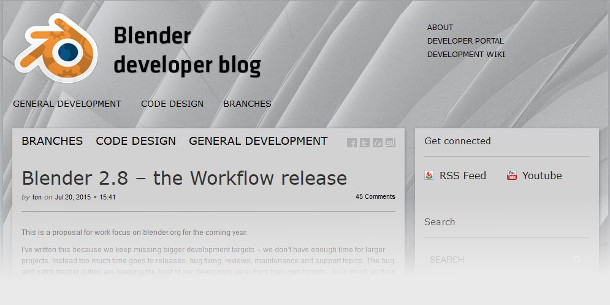See the proposed dev schedule for Blender 2.8
Blender Foundation chairman Ton Roosendaal just posted the Foundation’s proposal for Blender development over the next year – which is, essentially, not to do any major releases, to give the devs time to regroup.
If the plan is implemented, the upcoming Blender 2.76 would be the last ‘real’ release of the open-source 3D software until 2.80, some time in 2016. Any intervening releases would be essentially bug fixes.
Time to refocus?
“I’ve written this because we keep missing bigger development targets,” writes Roosendaal. “Instead too much time goes to releases, bug fixing, reviews, maintenance and support topics.”
“I think everyone has noticed that we’re floating too much, [that] things are not clear. Where are we heading? Who does what, and how do we decide on things?”
“It’s time to … refocus and get back energy, to maximize involvement from everyone who’s active in blender.org and make sure Blender can survive for many more years.”
Blender 2.8: a major overhaul
As well as taking time away from bi-monthly releases to focus on planning and documentation, the Foundation is proposing to spend the next year working on more major features for the 2.8x releases.
Candidates include a further UI overhaul, including Python configurability; a true PBR-quality viewport renderer; “better-designed integration” of physics; and improved asset management and handling of external files.
One consequence of this could be that 2.80 will not be fully backwards-compatible: Roosendaal is proposing that individual dev teams be “empowered to clean up quite radically and get rid of legacy code”.
Areas of the code base most likely to be affected include particles, physics and the Blender game engine.
Following the example of Blender 2.5
This wouldn’t be the first time that Blender development has taken a sabbatical: as Roosendaal points out, there was a break of over a year in 2008 prior to the 2.5 series of releases.
The result was, among other things, a major rewrite of the UI, rendering and animation systems.
So far, community feedback on Roosendaal’s proposal to do something similar in 2015 has been broadly positive. You can view the comments, and have your own say, via the link below.
Read the Blender Foundation’s proposed development schedule for Blender 2.8

